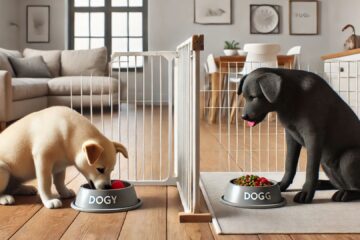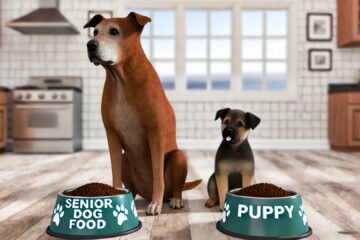When Emily first adopted Max, a curious and sprightly Beagle, she was meticulous about his diet, ensuring he got only the best. But one day, while visiting a friend who owns a rabbit, Max sneakily munched on some of the rabbit’s food. Panicked, Emily wondered, “Is rabbit food safe for dogs?”
This question isn’t unique to Emily—many dog owners find themselves pondering whether foods intended for other animals are safe for their canine companions.
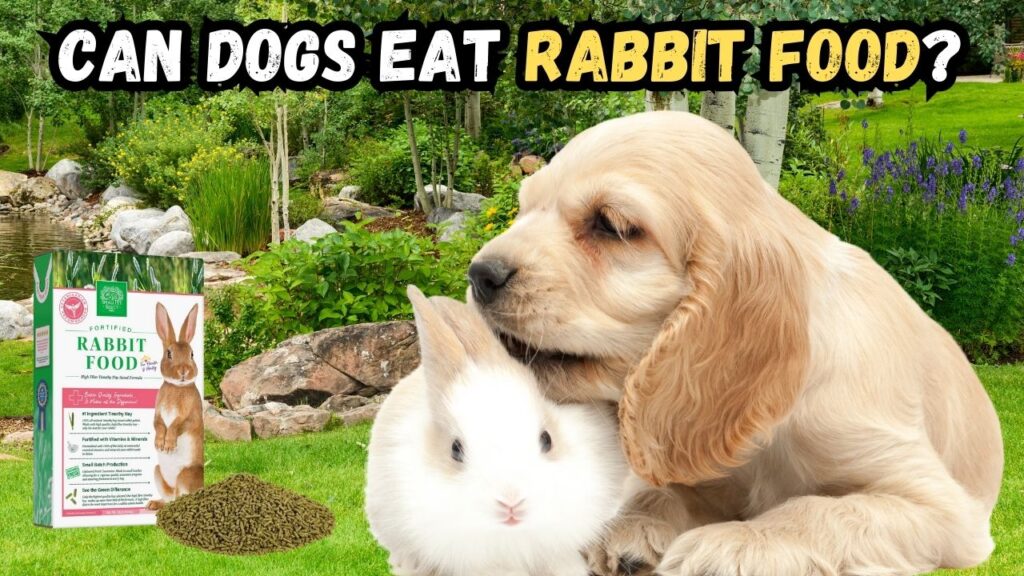
What Exactly is Rabbit Food?
Rabbit food primarily consists of pellets made from a blend of hay, vegetables, and a mix of vitamins and minerals specifically formulated to meet a rabbit’s dietary needs.
The primary component is usually high-fiber hay, crucial for a rabbit’s digestive health, along with a mix of soybean, oats, and wheat to provide a balanced diet.
Rabbit food also often contains seeds and nuts, which are high in fat but essential for a rabbit’s health.
Nutritional Needs and Suitability for Dogs
Dogs, unlike rabbits, are omnivores, meaning they require a mix of vegetables and meat for a balanced diet. The high fiber content in rabbit food, while beneficial for rabbits, is not necessary for dogs and can lead to digestive issues if consumed in large amounts.
Additionally, rabbit food lacks several nutrients essential for dogs, such as adequate protein and certain fats that support a dog’s energy levels and overall health.
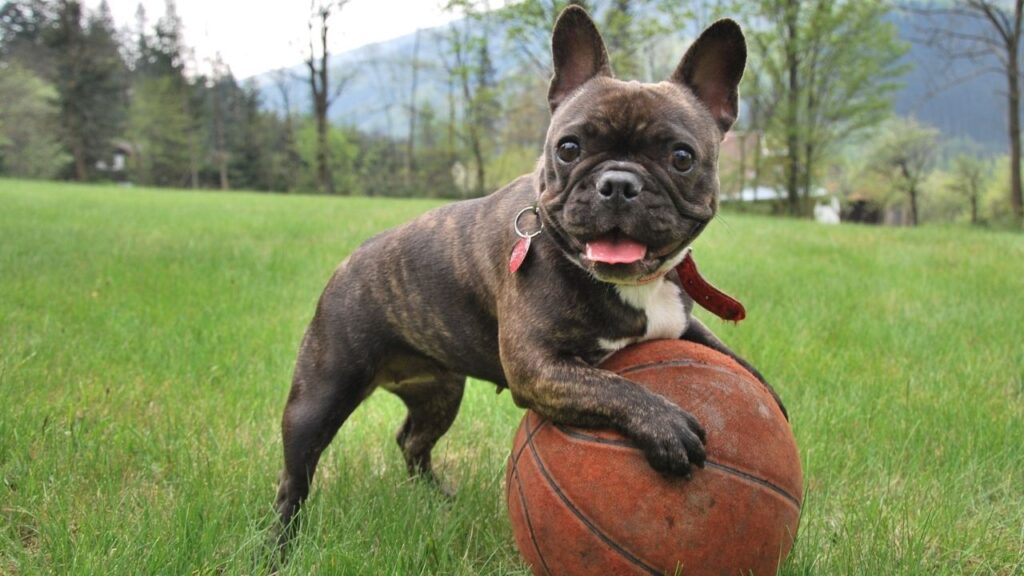
Risks and Benefits
Feeding your dog rabbit food occasionally and in small amounts is unlikely to cause harm. However, if a dog consumes rabbit food regularly, the lack of necessary nutrients could lead to nutritional deficiencies.
Moreover, some ingredients in rabbit food, like certain seeds or nuts, could potentially cause gastrointestinal blockages or other health issues in dogs.
Veterinary experts generally advise against replacing your dog’s regular diet with rabbit food. Dr. Xeeshan, a veterinarian specializing in canine nutrition, states,
“While an occasional small amount of rabbit food isn’t likely to be harmful, it doesn’t provide the balanced nutrition dogs need. It’s important to stick to a diet formulated specifically for dogs.”
While rabbit food isn’t toxic to dogs, it’s not advisable to include it in their regular diet. It doesn’t meet the nutritional needs of a dog and could lead to health issues if fed in large quantities or as a regular meal replacement.
Always consult your vet before introducing any new food into your dog’s diet.
Nutritional Comparison: Dog Food vs. Rabbit Food
To illustrate the differences between what’s formulated for dogs and rabbits, let’s take a close look at the nutritional content of a popular dog food brand, Ollie, compared to typical rabbit food.
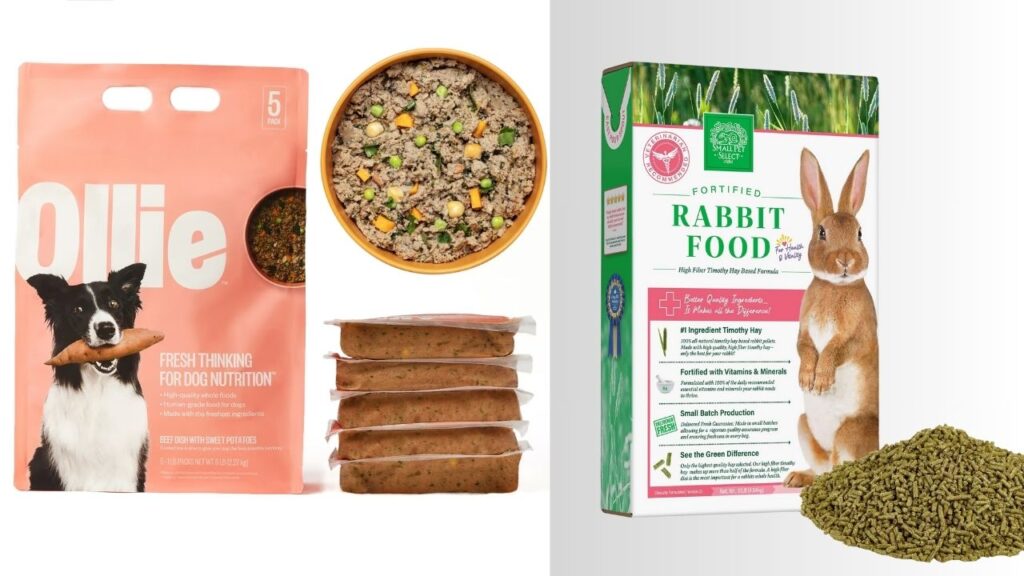
Nutritional Content Comparison
| Nutrient | Ollie Dog Food (per 100g) | Rabbit Food (per 100g) |
|---|---|---|
| Protein | 14g | 12g |
| Fat | 8g | 3g |
| Fiber | 2g | 14g |
| Moisture | 70% | 10% |
| Calories | 125 kcal | 110 kcal |
Ollie Dog Food values are approximate and can vary based on the specific product line.
As shown, rabbit food has significantly higher fiber content and lower moisture, making it less suitable for dogs, who require more protein and fat with moderate fiber to support their energy levels and digestive health.
Common Ingredients in Rabbit Food and Their Effects on Dogs
| Ingredient | Effect on Dogs |
|---|---|
| Hay | Excessive fiber can lead to gastrointestinal upset. |
| Soybean | Can be allergenic; provides protein but not the preferred source for dogs. |
| Oats | Generally safe in small amounts; provides energy. |
| Seeds and Nuts | Risk of choking or blockages; high-fat content could lead to pancreatitis. |
Impact of Rabbit Food on Dogs’ Health
Short-term Health Implications:
Ingesting rabbit food in small amounts might cause mild stomach upset in dogs, such as diarrhea or constipation due to the high fiber content. This is typically not severe if the exposure is limited.
Long-term Health Implications:
Regular consumption of rabbit food can lead to more serious nutritional imbalances in dogs. It lacks sufficient protein types and essential fatty acids necessary for a dog’s healthy skin, coat, and overall bodily functions.
Chronic dietary insufficiency can lead to weakened immunity, poor coat quality, and other health issues.
Specific Scenarios:
- For Dogs with Kidney Disease: High fiber might be beneficial in very specific cases, such as for dogs with certain types of kidney disease where reduced protein intake is recommended. However, the other nutritional deficiencies still make rabbit food an inappropriate choice.
- Overweight Dogs: The lower calorie content might seem beneficial, but the nutritional imbalance and high fiber could complicate overall health.
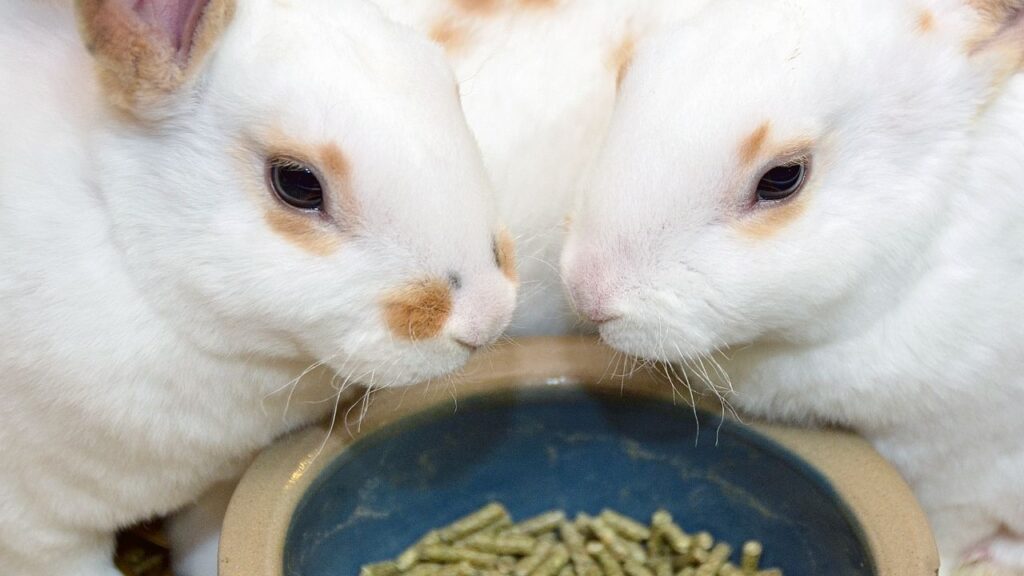
Alternatives to Rabbit Food for Dogs
For those seeking alternatives that might provide similar benefits to what rabbit food offers to rabbits (e.g., high fiber), consider the following dog-friendly options:
- High-fiber dog foods: Some dog foods are specially formulated with increased fiber for digestive health while still maintaining balanced nutrition.
- Supplements: Adding pumpkin or beet pulp to your dog’s diet can increase fiber safely.
Products replicating benefits of rabbit food components:
- Fiber-enhanced treats: These are designed for dogs that need a bit of extra fiber in their diets.
While rabbit food is not designed for canine consumption, understanding its content helps us make better dietary choices for our pets.
Always consult your vet before introducing new foods to your dog’s diet, especially if it’s as unconventional as rabbit food.
FAQs About Dogs and Rabbit Food
Can rabbit food replace dog food occasionally?
No, rabbit food should not replace dog food, even occasionally. Dog food is specifically formulated to meet all of a dog’s nutritional requirements, which are significantly different from those of a rabbit.
While an occasional nibble of rabbit food is unlikely to harm your dog, it should not be considered a meal replacement.
What symptoms should I look for if my dog accidentally eats rabbit food?
If your dog eats rabbit food, watch for symptoms such as diarrhea, vomiting, or constipation. Due to the high fiber content, some dogs might also show signs of bloating and discomfort. If any of these symptoms persist or worsen, it’s crucial to consult your veterinarian.
Are there any specific breeds of dogs that should avoid rabbit food entirely?
While no specific breeds must avoid rabbit food more than others, dogs with sensitive digestive systems or those prone to dietary allergies should steer clear of any non-canine specific food, including rabbit food.
Dogs with pre-existing health conditions like pancreatitis or obesity should also avoid foods high in fat and fiber that are not part of their recommended diet.
Can puppies eat rabbit food during their growth phase?
Puppies, in particular, should not eat rabbit food. Their growing bodies require specific nutrients found in puppy-formulated food to ensure proper development.
Rabbit food lacks many of these essential nutrients and can lead to growth and health issues in puppies.
Conclusion: Is Rabbit Food Suitable for Dogs?
To summarize, rabbit food is not suitable for dogs due to its nutritional composition, which does not align with the dietary needs of canines. While rabbit food is not toxic and may not harm your dog if ingested in small quantities, it lacks the crucial nutrients that dogs require for healthy growth and maintenance.
Regular consumption can lead to nutritional deficiencies and health problems.
Feeding your dog with the right diet tailored to their specific needs is crucial. Each dog’s dietary requirements can vary based on their age, breed, activity level, and health condition. As such, always choose dog food that meets AAFCO (Association of American Feed Control Officials) standards, ensuring it provides complete and balanced nutrition.
Lastly, any change in your dog’s diet should be done under the guidance of a veterinarian, especially if you’re considering unconventional food choices like rabbit food. Always consult with a professional to ensure the health and well-being of your furry friend.
